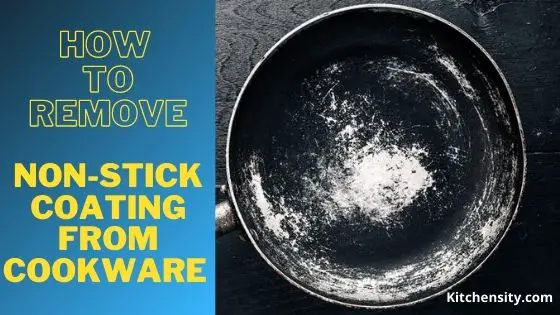Choosing the right pots and pans for your kitchen can feel like a bit of a head-scratcher. Imagine it as a friendly cook-off between two popular kitchen helpers: Carbon Steel vs Anodized Aluminum. I’m here to break down the basics and help you figure out which one might be your kitchen’s superhero.
In this article, I’ll discuss their heat skills, toughness, weight, and more. It’s all about finding the best sidekick for my cooking adventures, making my kitchen the ultimate hero zone.
Table of Contents
- 1 Quick Comparison: Carbon Steel Vs Anodized Aluminum Cookware.
- 2 What Is A Carbon Steel Cookware?
- 3 What Is An Anodized Aluminum Cookware?
- 4 Comparison Between Carbon Steel Vs Anodized Aluminum Cookware.
- 5 What Metal Is Better Than Carbon Steel?
- 6 Choosing The Right Cookware: Carbon Steel Vs Anodized Aluminum.
- 7 FAQs (Frequently Asked Questions).
Quick Comparison: Carbon Steel Vs Anodized Aluminum Cookware.
I have tested carbon steel cookware and found that it excels in high-heat cooking, offering exceptional heat retention and versatility with regular seasoning maintenance. Anodized aluminum cookware, on the other hand, provides even heat distribution, is lightweight, and is resistant to corrosion, requiring less maintenance. The choice depends on your cooking preferences, maintenance habits, and specific needs in the kitchen.
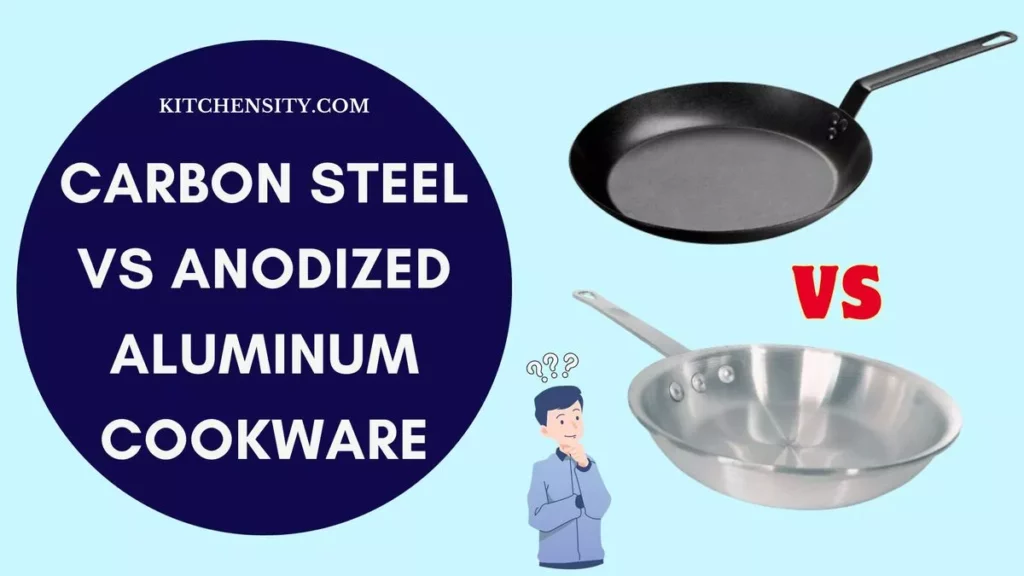
Also Read – Carbon Steel Vs Stainless Steel Vs Cast Iron Pans
Comparison Table Between Carbon Steel & Anodized Aluminum Cookware.
| Features | Carbon Steel Cookware | Anodized Aluminum Cookware |
| Heat Conductivity | Exceptional heat retention for high-temperature cooking. | Excellent heat conductivity for consistent heat distribution. |
| Durability and Longevity | Lasts a lifetime with proper care but is prone to rust if neglected. | Resistant to corrosion, providing enhanced longevity. |
| Weight and Handling | Heavier, offering a balance between sturdiness and manageability. | Lighter, ideal for those who prefer easy maneuverability. |
| Versatility in Cooking | Versatile for various cooking methods, including high-heat techniques. | Suitable for different techniques, providing even heat distribution. |
| Maintenance and Cleaning | Requires regular seasoning and careful maintenance. | Smooth, non-stick surface for easy cleaning, resistant to corrosion. |
| Cost Comparison | Mid-price range, affordable for quality cookware. | Slightly higher cost justified by enhanced durability and features. |
| Environmental Impact | Involves mining and refining, contributing to a carbon footprint. | More environmentally friendly due to efficient manufacturing and recyclability. |
Also Read – Shiny Metal Pan Vs Dark Nonstick Pan
What Is A Carbon Steel Cookware?
Carbon steel cookware is a type of kitchenware known for its durability, versatility, and excellent heat retention properties. Composed primarily of iron and carbon, this cookware combines the strength of cast iron with the lighter weight of stainless steel.
It is a favorite among professional chefs and home cooks alike due to its ability to handle high-heat cooking methods effectively. The manufacturing process involves shaping and treating sheets of carbon steel to create pans, skillets, woks, and other cookware items.
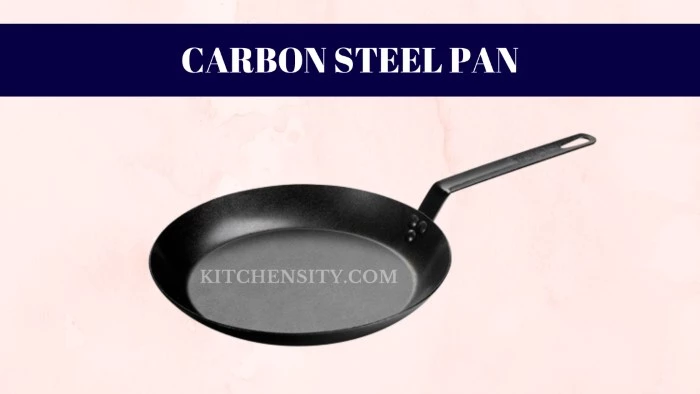
What sets carbon steel apart is its capacity to evenly distribute heat across its surface, ensuring consistent cooking results. This makes it particularly well-suited for tasks like searing, frying, and browning. Brands like Lodge and Matfer Bourgeat have gained acclaim for their high-quality carbon steel offerings.
Also Read – Baguette Pan Vs Baking Stone
Pros Of Carbon Steel Cookware.
- It provides even and consistent heat distribution for precise cooking.
- It withstands heavy use and lasts a lifetime with proper care.
- It is adaptable to various cooking methods.
- It is easy to handle despite its robustness.
- It is efficient for time-sensitive recipes.
- It is ideal for searing and high-heat techniques.
- It offers excellent performance at a reasonable cost.
- It is versatile across gas, electric, and induction stovetops.
- It develops a natural non-stick patina with use.
- It is preferred by chefs for consistent and high-quality results.
Cons Of Carbon Steel Cookware.
- It is susceptible to rust without proper drying and seasoning.
- Handwashing is required to preserve protective seasoning.
- It can react to acidic foods, requiring seasoning to mitigate.
- New users may need time to understand seasoning and care.
Also Read – Tube Pan Vs Bundt Pan
What Is An Anodized Aluminum Cookware?
Anodized aluminum cookware is made from aluminum that undergoes a special electrochemical process called anodization. This process enhances the durability, corrosion resistance, and non-reactive properties of the aluminum. The result is lightweight cookware with a hard surface, resistant to scratching and sticking.
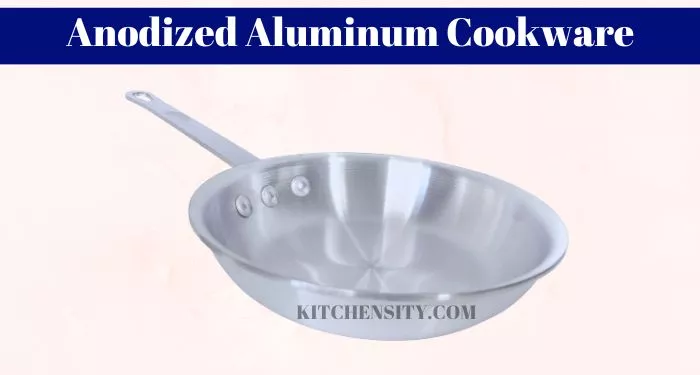
Brands like Calphalon and Circulon are known for producing high-quality anodized aluminum cookware, making it a popular choice for versatile and durable kitchen utensils.
Also Read – Copper Vs Titanium Cookware
Pros Of Anodized Aluminum Cookware.
- It provides consistent heat distribution for uniform cooking results.
- It is lightweight and easy to handle, making it convenient for daily kitchen use.
- It has a non-reactive surface, preventing interactions with acidic or alkaline ingredients.
- The anodization process strengthens the aluminum, increasing its durability and resistance to scratches.
- It has a smooth surface and non-stick properties, making it easy to clean.
- It is suitable for various cooking techniques, from frying to simmering delicate sauces.
- It is resistant to corrosion, ensuring a longer lifespan for the cookware.
- It has a sleek and modern appearance that adds aesthetic appeal to the kitchen.
Cons Of Anodized Aluminum Cookware.
- Anodized aluminum may lack magnetic properties, making it unsuitable for induction stovetops.
- While resistant to scratches, anodized aluminum benefits from careful handling to avoid potential damage.
- Over time, the anodized coating may wear off with frequent use and aggressive cleaning methods.
Also Read – Copper Vs Stainless Steel Pans
Comparison Between Carbon Steel Vs Anodized Aluminum Cookware.
When it comes to choosing the right cookware for your kitchen, two popular contenders that often spark a debate are carbon steel and anodized aluminum. Each material has its unique characteristics, and understanding the differences can help you make an informed decision based on your cooking preferences and needs.
1. Heat Conductivity.
- Carbon Steel: Known for exceptional heat retention, it excels in high-temperature cooking methods like searing. It provides even heat distribution across its surface, ensuring precise control over cooking temperatures.
- Anodized Aluminum: Offers excellent heat conductivity, providing consistent heat distribution during cooking. Its ability to distribute heat evenly makes it suitable for various cooking techniques.
2. Durability And Longevity.
- Carbon Steel: With proper seasoning and maintenance, carbon steel cookware can withstand heavy use and last a lifetime. However, neglecting care may lead to rusting, impacting its durability.
- Anodized Aluminum: The anodization process enhances the durability of aluminum, making anodized aluminum cookware resistant to corrosion. It provides a longer lifespan compared to regular aluminum.
Also Read – Shallow Vs Deep Baking Pans
3. Weight And Handling.
- Carbon Steel: While lighter than cast iron, carbon steel has some weight to it. This weight offers a balance between sturdiness and manageability, catering to those who appreciate a substantial feel in their cookware.
- Anodized Aluminum: Notably lighter than carbon steel, anodized aluminum is ideal for those who prefer easy maneuverability in the kitchen. It suits users who prioritize lightweight utensils for comfortable handling.
4. Versatility In Cooking.
- Carbon Steel: Versatile and suitable for various cooking methods, including searing, frying, and baking. It can handle high-heat cooking styles effectively.
- Anodized Aluminum: Well-suited for different cooking techniques, from frying to simmering delicate sauces. Its even heat distribution makes it versatile for a range of dishes.
Also Read – Hard Anodized Vs Cast Iron Cookware
5. Maintenance And Cleaning.
- Carbon Steel: Requires regular seasoning to maintain a non-stick surface and prevent rust. Careful drying and oil application are essential for long-term performance.
- Anodized Aluminum: Easy to clean with its smooth, non-stick surface. While resistant to corrosion, avoiding abrasive cleaning agents ensures the longevity of the anodized layer.
6. Cost Comparison.
- Carbon Steel: Falls within a mid-price range, offering excellent value for its durability and performance. Considered an affordable option for quality cookware.
- Anodized Aluminum: Typically priced slightly higher than carbon steel. The added cost is justified by its enhanced durability, corrosion resistance, and non-reactive properties.
Also Read – Hard Anodized Vs Titanium Cookware
7. Environmental Impact.
- Carbon Steel: Involves mining and refining processes, contributing to its carbon footprint. Considered less environmentally friendly compared to some alternatives.
- Anodized Aluminum: More environmentally friendly due to its efficient manufacturing process and recyclability. Presents a sustainable option for eco-conscious consumers.
8. Customer Reviews And Satisfaction.
- Carbon Steel: Enthusiasts praise its heat retention and versatility. Some mention the learning curve associated with seasoning.
- Anodized Aluminum: Users appreciate its even heat distribution and easy cleaning. Scratching and wear of the anodized layer may be mentioned in long-term reviews.
Also Read – Ceramic Cookware Vs Aluminum Cookware
What Metal Is Better Than Carbon Steel?
The “better” metal ultimately depends on factors like cooking style, maintenance preferences, and desired features, so consider these aspects when choosing the most suitable metal for your kitchen needs.
Stainless steel is a popular choice for its corrosion resistance, ease of maintenance, and sleek appearance. Cast iron is known for excellent heat retention and even heating, although it can be heavier and requires regular seasoning. Copper provides rapid, precise temperature changes but may need more maintenance.
Also Read – Titanium Coating Vs Ceramic Coating
Choosing The Right Cookware: Carbon Steel Vs Anodized Aluminum.
When deciding on cookware for your kitchen, consider your cooking preferences and maintenance habits.
Carbon steel is perfect for those valuing exceptional heat retention and versatility in high-heat cooking, with the requirement of regular seasoning. It offers a heavier, substantial feel. On the other hand, anodized aluminum suits those who prioritize even heat distribution, lightweight handling, and a non-reactive surface. It requires less maintenance, is resistant to corrosion, and is environmentally friendlier.
The choice hinges on factors like durability, weight, ease of cleaning, and compatibility with your preferred stovetop. Assessing these aspects will guide you in selecting the cookware that aligns best with your cooking style and kitchen needs.
Also Read – Seasoned Vs Unseasoned Cast Iron Skillet
FAQs (Frequently Asked Questions).
-
What Is The Primary Advantage Of Carbon Steel Cookware?
The primary advantage of carbon steel cookware is its exceptional heat retention, which allows for even and consistent cooking at high temperatures.
-
Which Is Better Carbon Steel Or Aluminum?
The choice between carbon steel and aluminum depends on your priorities. Carbon steel is excellent for high-heat cooking, offering durability and versatility with proper maintenance. On the other hand, aluminum is lighter, resistant to corrosion, and requires less upkeep, making it a solid choice for those prioritizing ease of use and maintenance.
-
Can Anodized Aluminum Cookware Be Used On Induction Stoves?
No, most standard anodized aluminum cookware cannot be used on induction stoves. Induction stoves require cookware with a magnetic base, which anodized aluminum lacks. However, some manufacturers offer anodized aluminum cookware with a magnetic base that is compatible with induction stoves.
-
How Often Should I Season My Carbon Steel Cookware?
The frequency of seasoning your carbon steel cookware depends on how often you use it and how well the seasoning holds up. You may need to season your carbon steel cookware every few months with regular use. However, if you notice food sticking to the surface or the pan losing its non-stick properties, it’s a sign that it needs re-seasoning.
-
Is Anodized Aluminum Cookware Dishwasher Safe?
Yes, anodized aluminum cookware is generally dishwasher safe. However, to prolong its lifespan and maintain its appearance, it’s recommended to hand wash anodized aluminum cookware whenever possible.
Katrina Smith is a seasoned expert with over 25 years of experience in all things related to cooking and the kitchen. As an avid cook and kitchen enthusiast, she is passionate about sharing her knowledge and expertise on cookware, kitchen appliances, kitchen tips, and kitchen staples.
Through her articles and reviews, Katrina aims to inspire and help others improve their cooking skills, experiment with different ingredients, and invest in quality cookware and appliances.

![How To Season And Clean Cast Iron Cookware? [4 Effective Ways] 5 How To Season And Clean Cast Iron Cookware](https://www.kitchensity.com/wp-content/uploads/2020/06/How-To-Season-And-Clean-Cast-Iron-Cookware.jpg)
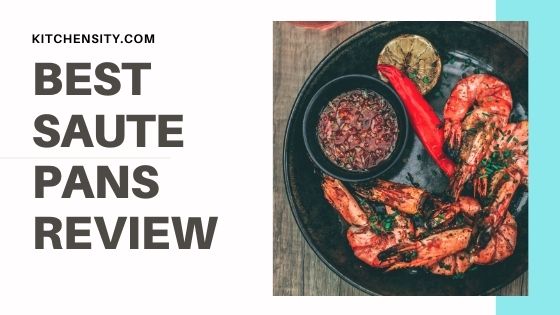
![Stainless Steel Vs Nonstick Vs Ceramic Cookware Set [An Ultimate Guide 2023] 7 Stainless Steel vs Nonstick vs Ceramic Cookware Set](https://www.kitchensity.com/wp-content/uploads/2019/09/Stainless-Steel-vs-Ceramic-vs-Nonstick-Cookware-Sets-e1621083482728.jpg)
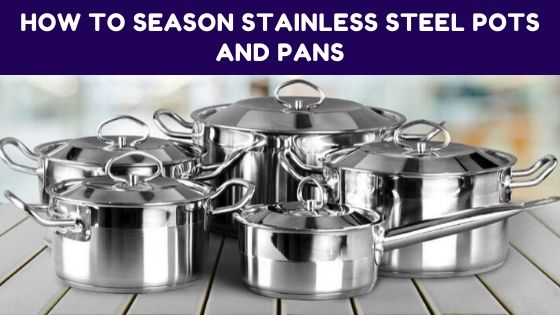
![What Pans Can You Use Cooking Spray On? [Ultimate Guide] 9 Types of pans with which cooking spray can be used](https://www.kitchensity.com/wp-content/uploads/2023/02/What-Pans-Can-You-Use-Cooking-Spray-On.jpg)
